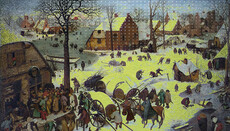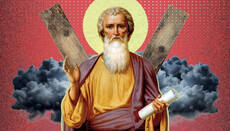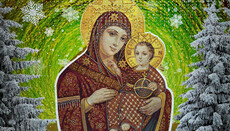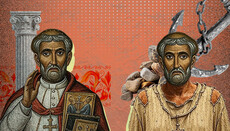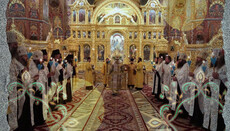Venerable Theodosius – A Light of All Rus’
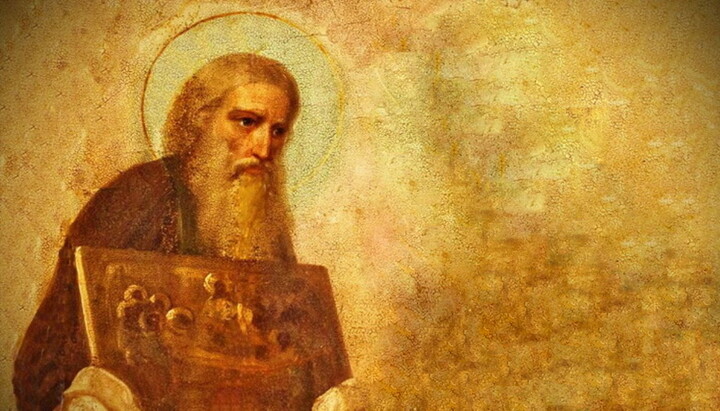
This is the title by which the people came to know Theodosius of the Caves. In this article, part of a series on the Kyiv-Pechersk Lavra, we explore how he lived and what legacy he left behind.
In the writings of the holy fathers and ascetics, one often finds descriptions of two paths or degrees of monastic striving: the active and the contemplative. The first, they believed, was a necessary step toward the second. In the person of Venerable Theodosius, both paths harmoniously coexisted. He was a fervent man of prayer and contemplation, yet also, in modern terms, a capable administrator and influential public figure. He could engage in politics, build a major monastery, and then retreat to a cave for solitary reflection. He also left behind teachings that remain relevant to this day.

When studying the life of Venerable Theodosius – as with most saints who lived many centuries ago – we encounter several challenges. First, there is a scarcity of historical sources. Second, there are the conventions of medieval hagiography, which required that a saint possess a set of obligatory virtues, work miracles, and so forth. Because of this, it becomes difficult to discern the saint’s true historical image and to distinguish between what actually happened and what is a pious embellishment.
Early Life
Even the date of Theodosius’s birth is disputed: some sources say 1008, others 1036 – a difference of nearly 30 years. A fairly detailed account of his life was written by Venerable Nestor the Chronicler in the 1080s. Additional information can be found in the Primary Chronicle and other sources. It is reliably known that Theodosius was born in Vasylkiv, 30 km south of Kyiv. This town had originally been a rural residence of Grand Prince Volodymyr, who took the Christian name Basil. Theodosius’s father was a wealthy military commander who was soon transferred to Kursk, where the saint spent his childhood and youth.
His family was pious and devout. As Theodosius himself later wrote in a letter to Prince Iziaslav:
"I, Theodos, a wretched monk, servant of the Most Holy Trinity, of the Father, and the Son, and the Holy Spirit, was born and raised in the pure and right-believing faith, brought up well in the law by my righteous father and Christian mother, who taught me to follow the good path and the customs of the Orthodox..."
.jpg)
At the age of seven, Theodosius began learning to read and write – an extraordinary achievement not only among commoners but even among those of noble birth. Influenced by books and stories of monasticism and ascetic struggle, the young Theodosius began to long for a life dedicated to God. When he was 13, his father died – an event that proved pivotal both for him and his mother. For the boy, this tragedy transformed desire into resolve. He began attending services more often, fasting strictly, and wearing chains as a form of ascetic discipline.
Confronted with the stark reality of death, and recognizing the futility of worldly honors and riches, Theodosius chose the path of renunciation and total service to God.
His mother, however, experienced a different kind of transformation. Having lost her husband, she poured all her hope and affection into her son, seeing in him her only support and desiring for him worldly success. These opposing aspirations inevitably led to conflict – especially given her harsh and authoritarian temperament. Discovering her son’s ascetic practices, she began to oppose his monastic inclinations: beating him, locking him in the house for days, and starving him.
Several times, Theodosius ran away from home – once with pilgrims, once to a nearby town to stay with a priest – but his mother always found him and punished him even more severely.
For years, he lived torn between his desire for the monastic life and the commandment to honor his parents. One day during a church service, he heard the Gospel words: “He who loves father or mother more than Me is not worthy of Me…” (Matthew 10:37), and understood this as the answer to his inner torment. Whether this episode occurred exactly as told is uncertain, but such moments are not uncommon in the lives of saints – and even in our own experience: profound questions, when brought before God in prayer and anguish, often receive an unexpected but clear answer.
This idea is underscored by Metropolitan Anthony of Sourozh. In one of his talks, he notes that while some Gospel dialogues feel distant to us, others resonate deeply – because they echo questions we ourselves have suffered through. And when an answer finally comes, it often does so precisely in the sacred space of the liturgy: a verse, a phrase, and suddenly we realize it is meant for us alone.
Likely, this is what happened with Theodosius. Around 1055 (or 1031, depending on the dating), he finally left home to enter a monastery. Traveling with a merchant caravan to Kyiv, he visited several major landowning monasteries but was rejected by all – perhaps because of his ragged appearance, a telling commentary on the monastic values of the time. His young age might also have played a role, assuming he was indeed born in 1036. Even so, 19 or 20 was considered adulthood in that era.
Rejected everywhere, he finally came to the cave of Venerable Anthony – perhaps having heard of him by chance.
Anthony, too, initially refused him. But seeing the elder’s austere life, Theodosius resolved to join this community. He spent several days outside the cave, without food or water, until he was finally admitted into the small brotherhood.
He was tonsured in 1056 (or 1032, according to another version). Whether by Anthony himself or by Nikon, we do not know. What is known is that his mother eventually tracked him down at the Caves Monastery. At first, he refused to see her, citing his monastic vows. But Anthony persuaded him to speak with her. The result was not his return home – but rather, his mother’s eventual withdrawal to a Kyiv convent.
Abbotship in the Lavra
From the very beginning, Theodosius lived an exceptionally austere life. After the removal of Abbot Barlaam, he was chosen to lead the community. This marked the beginning of a likely golden age for the monastery: Venerable Anthony lived in seclusion, emerging only for major matters, while Theodosius oversaw day-to-day life, construction, and pastoral care.
Under Theodosius’s leadership, the brotherhood grew from 20 to 100 monks. Soon, the caves could no longer accommodate them. At Anthony’s request, Prince Iziaslav granted the entire hill to the monks. Wooden cells and a church were built, and the foundation of the Dormition Cathedral was laid. The monastery grew in prominence and began receiving donations of land and wealth.
Was this beneficial? Materially – undoubtedly. Spiritually – the answer is more complex. Here is an excerpt from Theodosius’s exhortation to the brethren on the Thursday of the third week of Great Lent:
"Now I, a wretched one, having taken to heart the command of our good Master, say to you: it would be fitting for us to feed the poor and strangers from our labors, rather than to live in idleness, wandering from cell to cell. You’ve heard how Paul says: 'I did not eat anyone’s bread for free, but labored night and day… and my hands provided for me and for others' and again: 'If anyone is not willing to work, let him not eat.' But we have done none of this. If God had not shown us grace and fed us through God-loving people, what would become of us? Do we think our singing, or fasting, or vigils are the reason for these gifts? And we do not even bow once on behalf of those who give. [...] It is not right for us to hoard what God sends us for the good of souls and bodies. It is good to give to those in need."
During Great Lent, Theodosius would take a few loaves of bread and retreat to a cave, sealing the entrance with earth – leaving only a small window for urgent communication with the brethren.
As the brotherhood expanded, a monastic rule was needed. Around 1068, Theodosius requested a copy of the Studite Typikon from Constantinople and implemented it at the Pechersk monastery.
Political Turmoil
This same period saw major political upheaval in Kyiv. In 1068, following an uprising, Prince Iziaslav fled to Poland. Returning with Polish forces, he became hostile to Anthony, who had to flee to Chernihiv. Yet Iziaslav remained on good terms with Theodosius – visiting the monastery and inviting the abbot for private counsel.
Tradition holds that Iziaslav was Theodosius’s spiritual child. Yet despite this bond, Iziaslav threatened Anthony, who was forced into exile. Ironically, it was Iziaslav’s own brother, Sviatoslav – who would later seize the grand princely throne in 1073 – who helped Anthony escape.
Anthony returned to Kyiv, but Theodosius, loyal to Iziaslav, opposed Sviatoslav and publicly denounced his usurpation. Some sources say Theodosius even refused to commemorate Sviatoslav during services, continuing to pray for the exiled prince.
However, as Sviatoslav began to offer generous support to the Church and monastery, relations improved. Theodosius eventually recognized him as Grand Prince and even visited him at court. This shows that the differing political loyalties of Anthony and Theodosius never broke their spiritual unity.
The Blessed Repose
Venerable Theodosius departed to the Lord on May 3 (May 16 according to the new calendar), 1074. In 2024, we mark the 950th anniversary of his passing. His final illness was brief and mild. As he was dying, he instructed that he be buried in the cave where he had secluded himself during Great Lent for intensified prayer and contemplation.
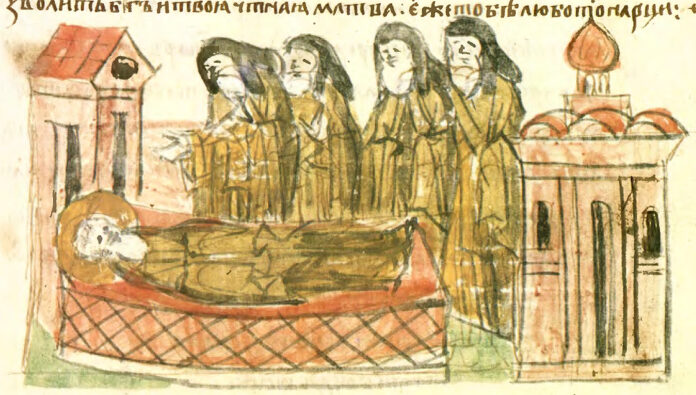
Already in 1090, just a year after the consecration of the Dormition Church, the monastic brotherhood decided to translate the relics of Venerable Theodosius there, which they did on the feast of the Dormition of the Most Holy Theotokos. According to the testimony of Venerable Nestor the Chronicler, the relics were incorrupt: “only the hair had settled to the head.”
The Writings of Venerable Theodosius
The literary legacy of Venerable Theodosius is of considerable interest. It includes two letters to Prince Iziaslav, eight exhortations, and one prayer. The authenticity of other works attributed to him is doubtful. We will address the letters to the prince shortly. As for the exhortations, two are titled “On Spiritual Benefit,” one is “A Word to the Cellarer,” and the rest are named:
- On Patience and Love
- On Patience, Love, and Fasting
- On Patience and Almsgiving
- On Patience and Humility
- On Going to Church and Prayer
From these titles, we can discern which virtues the saint deemed most essential and which he sought to instill in the brethren. As an example, here is his interpretation of the Gospel parable of the ten virgins:
“You have heard the parable of the ten virgins – five wise and five foolish. The Holy Gospel declares: the wise preserved their virginity and adorned their lamps with almsgiving and faith, and thus entered into the bridal chamber of joy, and none hindered them. Why then were the others called foolish? Because they preserved their virgin seal and wore down their flesh through fasting, vigil, and prayer, yet brought no oil of mercy into the lamps of their souls, and so they were cast out of the bridal chamber. Then they ran to seek the sellers of mercy – the poor – but found them not, for the doors of God’s loving-kindness had already been shut.”
One of the letters to Prince Iziaslav concerns whether it is permissible to slaughter animals and eat meat on a Sunday (today, this might be compared to a question about grilling kebabs). Theodosius’s answer, in short, is: yes, it is permitted. He also offers advice about fasting on Wednesdays and Fridays, which, though not elaborated in detail, is notably more lenient than today’s practices. He advises consulting one’s spiritual father when choosing a measure of fasting.
Far more significant is his Letter on the Latin Faith. In it, Theodosius speaks very negatively of Catholicism, yet simultaneously urges that almsgiving be shown to all, regardless of their faith.
“I, Theodos, a lowly monk, servant of the Most Holy Trinity – Father, Son, and Holy Spirit – was born and raised in the pure and true faith, brought up in righteousness by an Orthodox father and a Christian mother, who taught me to follow the righteous path and Orthodox customs. Do not join the Latin faith, do not follow their customs, reject their communion, do not listen to their teachings, abhor and guard yourself against all their ways and habits. Do not give your daughters to them in marriage, nor take their daughters as wives. Do not fraternize with them, bow to them, or kiss them. Do not eat from the same dish, nor drink with them, nor take their food.”
What is particularly noteworthy is that Theodosius presents these words as a teaching from his parents, not merely his own opinion. This suggests that such a staunch rejection of Catholicism existed in Rus’ as early as the late 10th and early 11th centuries, even before the official schism. If we examine Catholic Church history, we see that this was a time when it was emerging from one of the most shameful periods in its history – the so-called Pornocracy (a recognized academic term), which lasted roughly from 904 to 963.
This era was marked by profound moral corruption in the Vatican, which spread like ripples throughout the Western Church.
This is reflected in Theodosius’s letter:
“Their priests do not marry in lawful wedlock, but conceive children by their maidservants and continue in ministry without shame. Their bishops keep concubines and go to war.”
At the time, the Catholic Church was also plagued by rampant simony and a power struggle with secular rulers over who had the authority to appoint popes and bishops – a conflict that led to Pope Gregory VII’s Gregorian Reforms in 1075.
Yet Theodosius’s harsh attitude toward Latin Christians stemmed not only from their moral decay but also from what he viewed as doctrinal heresy:
“Moreover, they claim that the Holy Spirit proceeds from the Father and the Son. But we do not say ‘and from the Son.’ And there are many other errors in their ways – wrong, corrupt, filled with destruction are both their faith and their deeds. Even the Jews do not commit some of what they do. They often fall into the Sabellian heresy.”
In especially strong language, Theodosius exhorts his hearers to remain steadfast in the Orthodox faith. Yet, in humility, he attributes these words to his father, who, it bears recalling, was a military commander:
“My father said to me: ‘Guard yourself, my child, from the heterodox and all their schemes, for our land is now full of people of this corrupt faith. He who lives in the righteous faith will, through it, save his soul. There is no faith better than our one, pure, and holy Orthodox faith. By living in it, one may be delivered from sin and spared eternal torment, may become a partaker in eternal life, and rejoice with the saints forever. But one who abides in another faith – be it Latin, Armenian, or Saracen – will not see eternal life nor share in the portion of the saints.’”
Another striking point is that Theodosius urges those knowledgeable about the errors of Catholicism to raise their voices in defense of Orthodoxy and not allow the Latin Christians to mislead the unlearned. Again, this exhortation begins: “My father said to me…”
“And you, my child, if you see any heretics arguing with Orthodox Christians about the faith and trying through deceit to turn the simple away from the true faith, then you, who possess understanding, must not hide your knowledge. Help the faithful against the unfaithful. If you help them, you will rescue them like sheep from the jaws of lions. But if you remain silent, it will be as though you took them from Christ and handed them to Satan – for it is he who taught the heretics their false faith.”
An interesting fact: despite Theodosius’s unmistakably and fiercely negative stance toward Catholics, they nevertheless recognize him as a saint.
Ukrainian Catholics – both of the Eastern and Latin rites – venerate his memory. When it comes to winning over Orthodox hearts, any means will do. Very Jesuit-like.
There is a theory that Theodosius did not write the Letter on the Latin Faith to Prince Iziaslav without reason –and that he had genuine cause for concern. During his exiles from Kyiv, Iziaslav repeatedly sought military assistance from Western rulers. Frequently, the price of such aid was compromises in matters of faith. Perhaps Theodosius feared just such a scenario. While this remains only a theory, it is noteworthy that after Theodosius’s death, when Iziaslav was once again expelled from Kyiv and wandered through Europe seeking help, he sent his son, Prince Yaropolk of Volhynia, to Rome in 1075 to negotiate with Pope Gregory VII.
Conclusion
If one were to describe the spiritual character of Venerable Theodosius in just two words, they would be faith and humility. He carried with him unwavering faith in Orthodoxy and humble endurance of suffering from his earliest years to the very end of his life. He showed us how the highest monastic striving can be combined with earthly concerns for the brethren and the well-being of the monastery. He left behind teachings which we must follow if we hope to share his blessed lot in eternity.
The history of our nation shows that we have, at times, forgotten these teachings – whether in terms of his exhortations to show mercy to others, his calls for patience and humility, or his warnings not to stray into the Latin faith. One need only recall the period following the Union of Brest in 1596, when the Greek Catholics seized nearly all episcopal sees and the majority of Orthodox churches. Nothing good came of it.
Today, our country again stands at a crossroads. Today again we see turmoil, enmity, and people turning against one another. Today again there are attempts to impose unity with the Catholics. Will we now heed the testament of our venerable father Theodosius – or will we once again repeat the errors of history? That question remains open.
Venerable Father Theodosius, pray to God for us!
